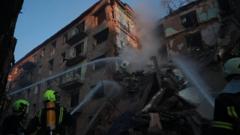As military action intensifies, Israel has bombed critical locations in Tehran, claiming to target Iranian military infrastructure. This follows U.S. strikes on nuclear sites, prompting fears of retaliation from Iran and escalating regional tensions, with significant international calls for a peaceful resolution.
Escalating Conflict: Israel Strikes Tehran Amid Fears of Iranian Retaliation

Escalating Conflict: Israel Strikes Tehran Amid Fears of Iranian Retaliation
In a significant escalation of military tensions, Israel has targeted key sites in Tehran following U.S. airstrikes on Iranian nuclear facilities, while Iran considers its response.
In a dramatic turn of events, Israel has launched extensive airstrikes on Tehran, attacking paramount military sites, including a paramilitary headquarters and the infamous Evin Prison, as the conflict with Iran deepens. These strikes occurred shortly after the U.S. initiated military action against Iranian nuclear facilities, igniting widespread concerns over escalating violence in the region.
Israeli military officials stated that their recent operations were aimed at crippling the command centers of the Iranian Revolutionary Guards. This escalation is already prompting Iranian responses, as multiple missile attacks targeted Israeli territory, causing air raid alerts in cities like Haifa. Local reports indicate a significant lull in injuries from these attacks, primarily involving anxiety related to missile threats.
On the diplomatic front, world leaders are calling for a cessation of hostilities. President Trump, having declared the irreversible damage to Iran's nuclear program through recent U.S. airstrikes, emphasized that preventing Iran from developing nuclear capabilities remains paramount. However, his administration is cautious, asserting they do not desire a protracted war.
European leaders gathered in Brussels urged diplomatic routes to halt the violence, with even the U.N. nuclear watchdog warning that continued military actions could spiral into catastrophic consequences. As U.S. officials monitor signs of Iranian preparations for retaliation against American military bases, the specter of broader conflict looms.
Meanwhile, the situation on the ground remains precarious. Reports have surfaced revealing that strikes have disrupted power lines in northern Tehran, affecting millions. Simultaneously, incidents of property damage and fears of more missile exchanges keep communities on edge.
With the Iranian leadership weighing its potential responses, including threats to close the strategic Strait of Hormuz—a critical global oil shipping route—analysts warn that any aggressive moves could drastically alter geopolitical dynamics. The U.S. military's readiness for potential Iranian actions remains a top priority as the region braces for what could be an extended period of instability.
As both sides contemplate their next steps, the call for peace and negotiation grows increasingly urgent, marking a critical juncture in an already fraught international landscape.
Israeli military officials stated that their recent operations were aimed at crippling the command centers of the Iranian Revolutionary Guards. This escalation is already prompting Iranian responses, as multiple missile attacks targeted Israeli territory, causing air raid alerts in cities like Haifa. Local reports indicate a significant lull in injuries from these attacks, primarily involving anxiety related to missile threats.
On the diplomatic front, world leaders are calling for a cessation of hostilities. President Trump, having declared the irreversible damage to Iran's nuclear program through recent U.S. airstrikes, emphasized that preventing Iran from developing nuclear capabilities remains paramount. However, his administration is cautious, asserting they do not desire a protracted war.
European leaders gathered in Brussels urged diplomatic routes to halt the violence, with even the U.N. nuclear watchdog warning that continued military actions could spiral into catastrophic consequences. As U.S. officials monitor signs of Iranian preparations for retaliation against American military bases, the specter of broader conflict looms.
Meanwhile, the situation on the ground remains precarious. Reports have surfaced revealing that strikes have disrupted power lines in northern Tehran, affecting millions. Simultaneously, incidents of property damage and fears of more missile exchanges keep communities on edge.
With the Iranian leadership weighing its potential responses, including threats to close the strategic Strait of Hormuz—a critical global oil shipping route—analysts warn that any aggressive moves could drastically alter geopolitical dynamics. The U.S. military's readiness for potential Iranian actions remains a top priority as the region braces for what could be an extended period of instability.
As both sides contemplate their next steps, the call for peace and negotiation grows increasingly urgent, marking a critical juncture in an already fraught international landscape.























